
People’s Republic of China

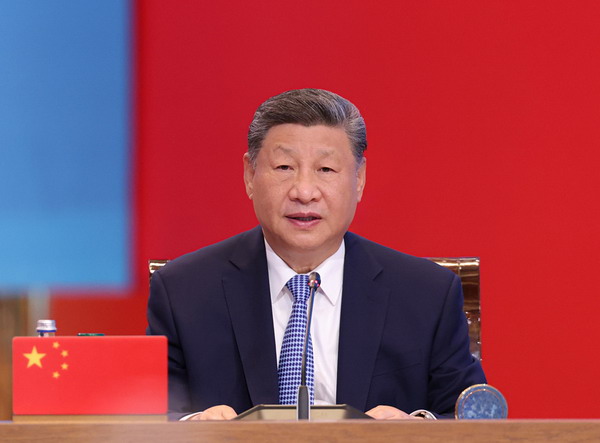
On the afternoon of June 17, 2025 local time, the second China-Central Asia Summit was held at the Palace of Independence in Astana. Kazakh President Kassym-Jomart Tokayev chaired the meeting. Chinese President Xi Jinping, Kyrgyz President Sadyr Japarov, Tajik President Emomali Rahmon, Turkmen President Serdar Berdimuhamedov and Uzbek President Shavkat Mirziyoyev were present. The heads of state, in a friendly atmosphere, jointly reviewed the outcomes of China-Central Asia cooperation across various fields since the Xi'an Summit, and looked forward to future development. They unanimously agreed to carry forward the China-Central Asia Spirit, uphold everlasting good-neighborliness and friendship, and work together to make continuous and new achievements in building a China-Central Asia community with a shared future.
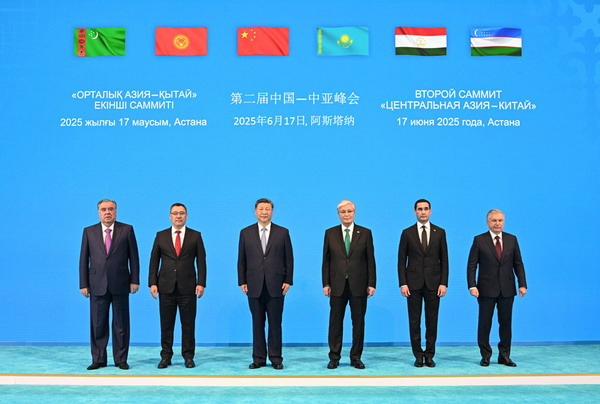
Xi Jinping took a group photo with the heads of state of the five Central Asian countries, then attended the summit and delivered a keynote speech titled "Championing the China-Central Asia Spirit for High-Quality Cooperation in the Region".
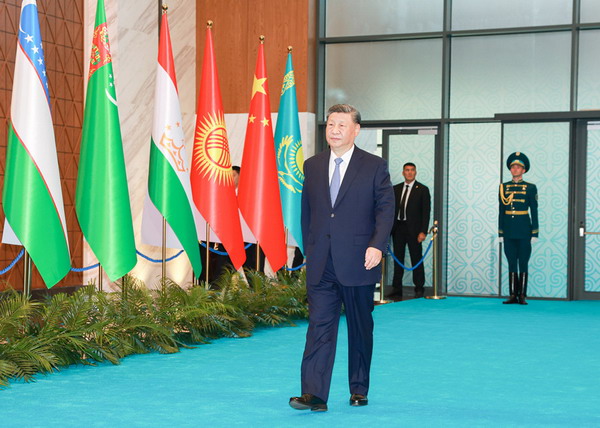
Xi Jinping noted that during their meeting in Xi'an two years ago, they jointly outlined the Xi'an Vision for China-Central Asia cooperation. Two years on, China and Central Asian countries have further deepened and substantiated Belt and Road cooperation. They have made important progress in cooperation across various fields. The core framework of the China-Central Asia mechanism is largely in place. The consensus at the first Summit has been implemented across the board. The path of their cooperation is steadily widening, and their friendship is blooming ever more brightly.
Xi Jinping stressed that their cooperation is rooted in more than 2,000 years of friendly exchanges, cemented by solidarity and mutual trust cultivated through more than three decades of diplomatic relations, and taken forward via openness and win-win cooperation of the new era. Building on their collective efforts over the years, they have forged a China-Central Asia Spirit of "mutual respect, mutual trust, mutual benefit, and mutual assistance for the joint pursuit of modernization through high-quality development". They practice mutual respect and treat each other as equals. All countries, big or small, are equal. They handle issues through consultation and make decisions by consensus. They seek to deepen mutual trust and enhance mutual support. They firmly support each other in safeguarding independence, sovereignty, territorial integrity, and national dignity. They do not do anything harmful to the core interests of any party. They pursue mutual benefit and win-win cooperation and strive for common development. They view each other as priority partners, and share development opportunities together. They accommodate each other's interests, and work to build a win-win and symbiotic relationship. They help each other in time of need and stand together through thick and thin. They support each other in choosing development paths suitable to their respective national conditions and in taking domestic matters into their own hands. They work together to address various risks and challenges, and uphold regional security and stability. This China-Central Asia Spirit is an important guideline for their endeavor to carry forward friendship and cooperation from generation to generation. They should always uphold it and let it shine forever.
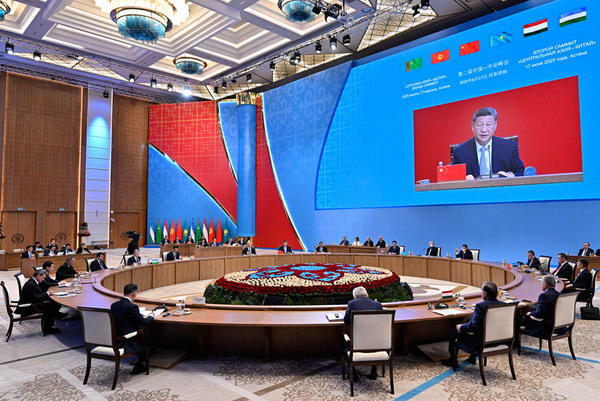
Xi Jinping pointed out that today, unprecedented changes are unfolding at a faster pace across the globe, thrusting the world into a new state of heightened turbulence and volatility. A strong belief in fairness and justice and an unyielding commitment to mutual benefit and win-win cooperation are the only way to maintain world peace and achieve common development. There is no winner in tariff wars or trade wars. Unilateralism, protectionism and hegemonism will surely backfire while hurting others. History should move forward, not backward; and the world should be united, not divided. Humanity must not regress to the law of the jungle. Instead, countries should build a community with a shared future for mankind. China and Central Asian countries should act on the China-Central Asia Spirit, enhance cooperation with renewed vigor and more practical measures, promote high-quality development of the Belt and Road Initiative, and forge ahead toward the goal of a community with a shared future for the region.
First, China and Central Asian countries should stay committed to their fundamental goal of unity, and always trust and support each other. China consistently takes Central Asia as a priority in its neighborhood diplomacy. With a firm belief in an amicable, secure and prosperous neighborhood as well as a strong dedication to amity, sincerity, mutual benefit and inclusiveness, China interacts with Central Asian countries on the basis of equality and sincerity. China always wishes its neighbors well. The six countries will sign together a treaty on eternal good-neighborliness, friendship and cooperation to enshrine the principle of everlasting friendship in the form of law. This is a new landmark in the history of the relations between the six countries and a pioneering initiative in China's diplomatic engagement with its neighbors. It is a milestone for today and a foundation for tomorrow.
Second, China and Central Asian countries should optimize their cooperation framework to make it more results-oriented, more efficient, and more deeply integrated. The six countries have agreed to designate 2025 and 2026 as the Years of High-Quality Development of China-Central Asia Cooperation. The six countries should focus their cooperation on smooth trade, industrial investment, connectivity, green mining, agricultural modernization and personnel exchanges, roll out more projects on the ground, and foster new quality productive forces. China has decided to establish three cooperation centers, i.e. on poverty reduction, on education exchange, and on desertification prevention and control, as well as a cooperation platform on smooth trade under the China-Central Asia cooperation framework. China will support Central Asian countries in implementing livelihood and development projects. China will also provide 3,000 training opportunities to Central Asian countries in the next two years.
Third, China and Central Asian countries should develop a security framework for peace, tranquility and solidarity. The six countries should step up regional security governance, deepen law enforcement and security cooperation, jointly prevent and thwart extreme ideologies, and resolutely fight terrorism, separatism and extremism, so as to maintain peace and stability in the region. China will do its best to help Central Asian countries combat terrorism and transnational organized crime and safeguard cybersecurity and biosecurity.
Fourth, China and Central Asian countries should cement the bonds of shared vision, mutual understanding and mutual affection between their peoples. China will enhance cooperation between legislatures, political parties, women, youth, media and think tanks with Central Asian countries, and conduct an in-depth exchange of governance experience. China is ready to set up more cultural centers, university branches and Luban Workshops in Central Asia to train more high-caliber talent for Central Asian countries. China supports deepening subnational cooperation. China and Central Asian countries will nurture heart-to-heart connections at central and subnational levels, between official and non-governmental actors, and from adjacent to broader areas.
Fifth, China and Central Asian countries should uphold a fair and equitable international order and an equal and orderly world structure. The six countries should join hands to defend international fairness and justice, oppose hegemonism and power politics, and promote an equal and orderly multipolar world and a universally beneficial and inclusive economic globalization. This year marks the 80th anniversary of the victory of the Chinese People's War of Resistance Against Japanese Aggression and the World Anti-Fascist War, and the 80th anniversary of the founding of the United Nations (U.N.). In the strenuous times of war, Chinese and Central Asian peoples supported each other through adversity, and jointly made important contributions to the cause of justice of humanity. The six countries should promote the correct view of history, defend the fruits of the victory of World War II, uphold the U.N.-centered international system, and provide more stability and certainty for world peace and development.
Xi Jinping finally pointed out that China is building a great modern socialist country in all respects and advancing the great rejuvenation of the Chinese nation on all fronts through Chinese modernization. No matter how the international situation changes, China will remain unwavering in opening up to the outside world. China is ready to embrace higher-quality cooperation with Central Asian countries to deepen the integration of interests, achieve common development and strive for new progress in China-Central Asia cooperation.
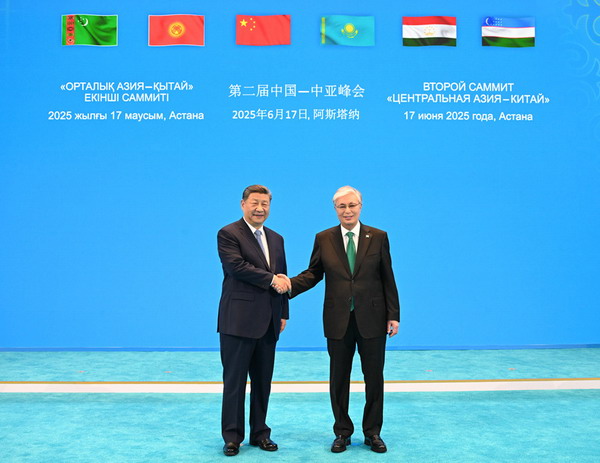
The leaders of the five Central Asian countries, including President of Kazakhstan Kassym-Jomart Tokayev, unanimously stated that under the outstanding leadership of President Xi Jinping, China has made remarkable development achievements. They expressed their appreciation for China's comprehensive cooperation with Central Asian countries, which has brought valuable development opportunities to their countries. The China-Central Asia mechanism has become an important platform for promoting bilateral dialogue and cooperation, and advancing the economic and social development of Central Asian countries. In a world full of uncertainties, the strategic significance of the China-Central Asia mechanism has become even more prominent. China's prosperity and strength are delivering tangible benefits to neighboring countries. China is a strategic partner and a true friend that Central Asian countries can trust permanently. The Central Asian countries highly value the model of mutual respect, equality, and mutually beneficial cooperation with China. They look forward to strengthening all-round cooperation with China, expanding the scale of trade and investment, advancing high-quality Belt and Road cooperation, and promoting cooperation in areas such as industry, agriculture, science and technology, infrastructure, new energy, and connectivity. They also look forward to enhancing regional security coordination, and intensifying people-to-people exchanges in such fields as culture, education and tourism, so as to build the China-Central Asia mechanism into a model of regional cooperation, share development and prosperity together, jointly promote peace and stability, and build a closer community with a shared future. All parties highly commended China's constructive role in international and regional affairs and expressed active support for the vision of building a community with a shared future for mankind and the three major global initiatives put forth by President Xi Jinping. They also expressed their willingness to strengthen coordination and cooperation with China, firmly uphold free trade and the multilateral trading system, and jointly defend international fairness and justice.
During the summit, President Xi Jinping and the heads of state of the five Central Asian countries signed the Astana Declaration of the Second China-Central Asia Summit and a treaty on eternal good-neighborliness, friendship and cooperation between the People's Republic of China and the Republic of Kazakhstan, the Kyrgyz Republic, the Republic of Tajikistan, Turkmenistan, and the Republic of Uzbekistan.
The summit also announced the signing of 12 cooperation documents regarding the Belt and Road cooperation, facilitation of people-to-people exchanges, green minerals, smooth trade, connectivity, industry, customs, and other sectors. During the summit, China and the five Central Asian countries signed multiple sister-city agreements, bringing the total number of sister-city relationships between the two sides to over 100 pairs.
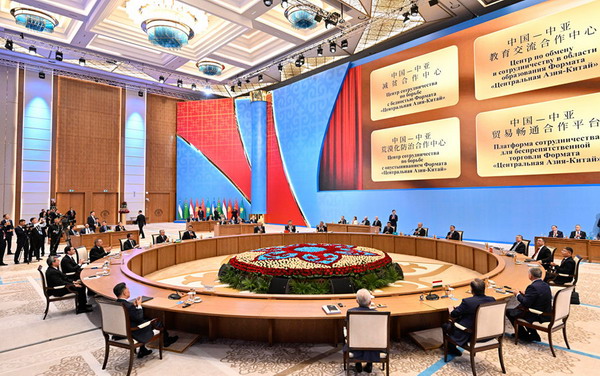
Xi Jinping, together with the presidents of the five Central Asian countries, attended the inauguration ceremony of the China-Central Asia Cooperation Centers on Poverty Reduction, on Education Exchange, and on Desertification Prevention, as well as the Cooperation Platform on Smooth Trade.
All parties agreed that China will host the third China-Central Asia Summit in 2027.
On the evening, Xi Jinping attended a welcome banquet hosted by President Kassym-Jomart Tokayev for the heads of state participating in the summit.
Cai Qi, Wang Yi, and others were present at the above events.



